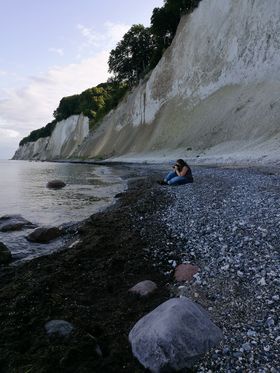Leoni:
During lockdown Mary and I both worked remotely on internships regarding impression formation alongside Dr Clare Sutherland. Although at times challenging, it has been a rewarding process. I learned a lot throughout. Not only did I develop my academic knowledge but also practical skills like working with Excel, Testable and online recruitment platforms. Some of the processes are quite different to lab-based research, mainly the online participant recruitment, which is much faster and anonymous. What I found most enjoyable was to work with the stimuli and data, which you have more time for as you do not spend it on participant recruitment. Seeing the experiment come alive and finding some very promising results, I felt a drive to discover more. For me, it has been an invaluable experience.
I especially enjoyed the flexibility and freedom of conducting research remotely and the possibilities that arise from it. Dr Sutherlands’s lab is truly international and so I worked with people from all around the world. In this way, I was able to profit from their knowledge and input. I gained a lot through this network and acquired new knowledge because of it, helping my personal development but also strengthening the research.
What Mary and I both found difficult with online research was how abstract it could be. We couldn’t go into the lab to conduct the experiment; we were not able to talk to participants on how they found the study and did not have many researchers around us in person. We both missed receiving feedback from participants and perhaps the more social aspects that come with research. Nevertheless, staying in contact with other people online, and working through problems together definitely helped, as the internship seemed less…remote!
Mary:
The internship being online meant I had the freedom of travelling back home to Greece, while still being in touch with Dr Sutherland and successfully conducting our research. Being quite self-motivated I really enjoyed the flexible schedule that naturally came with my internship, as it meant I had the freedom of planning my itinerary and managing my time according to other responsibilities. This freedom was something Leoni and I both saw as a great benefit.
Although I have enjoyed conducting research as part of the methodology courses in each term, I had not considered research as a possible career option up until my internship. I definitely loved the independent aspect that came as a result of working on my own project (as opposed to in a group). Nevertheless, this is not to say I was on my own. Dr Sutherland was always there to answer any questions and clarify any information, and keeping in contact with Leoni also helped as we were able to support each other during the process! Having completed this internship in the summer just before entering Year 4, was certainly great practice for my thesis project! It gave me the chance to work on pre-existing skills such as data analysis, and also learn new skills such as using new software to set up a study online.
This opportunity was truly invaluable as I not only learned new skills regarding research, but also developed character traits such as independence and staying on top of things. The pandemic will most certainly have long-lasting changes in how work, research, etc. is conducted, therefore our internships were great at providing us with insight and experience into a new way of working. Conducting research has been a fun and an exciting process for both of us, even when working remotely. It was absolutely worth doing!
Leoni would like to thank the Development Trust for the funding of the research, and Mary would like to thank the School of Psychology at the University of Aberdeen.
Leoni Masroujah is a Level 3 BSc Psychology student and Mary El Champasi is a Level 4 MA Psychology student, both at the University of Aberdeen.


